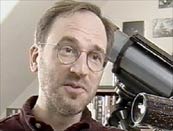Can you think about some of the lines you�re most proud of, technically?
 It�s fun to invent new words and part of the pleasure of working on Star Trek is the opportunity to occasionally coin a word or a phrase that will show up in books about Star Trek years down the road and that fans will remember and ask you about when you meet them. A few things I came up with... this notion of the duonetic field. That was used in the Deep Space Nine Deep Space Nine episode about a planet where none of our devices would function properly because there was some sort of electromagnetic field, presumably, that interfered with the functionality of all of our devices. All of the terms that I came up with that were real physics were just too much of a mouthful or they didn�t really work. They weren�t really supportable on a scientific level.
It�s fun to invent new words and part of the pleasure of working on Star Trek is the opportunity to occasionally coin a word or a phrase that will show up in books about Star Trek years down the road and that fans will remember and ask you about when you meet them. A few things I came up with... this notion of the duonetic field. That was used in the Deep Space Nine Deep Space Nine episode about a planet where none of our devices would function properly because there was some sort of electromagnetic field, presumably, that interfered with the functionality of all of our devices. All of the terms that I came up with that were real physics were just too much of a mouthful or they didn�t really work. They weren�t really supportable on a scientific level.
In the original series they talked about duotronic circuits for the control systems on the Enterprise and I thought, well, if there are duotronic circuits, maybe there are duonetic fields. It�s kind of a play on magnetic, just as duotronic is a play on electronic. And so I thought hey, the duonetic field. That was kind of fun.
The osteogenic stimluator. We show the doctors occasionally with someone who�s fractured a bone or broken a bone.They'll wave this device over the break and it starts to heal almost instantaneously. What is that device called? Well I thought how about an osteogenic stimulator. Stimulates the production of new bone tissue. Osteo is the latin word for bone. So that�s fun to do from time to time, but ultimately, I think, that�s sort of the smaller part of a Star Trek script. It�s important, it�s interesting to do, it�s interesting to hear, but I think what really drives the show is the story.
If we�ve come up with a good story, we�ve got great characters and great actors to do those stories. In my mind the shows really take off when we just tell compelling stories that have interesting layers of some important question about life and human nature, played against a science fictional background. So that, for me, the technical language which some people lovingly refer to as technobabble, is fun and it certainly has its place and an important role, but I think Star Trek is really about telling compelling stories about the future.
